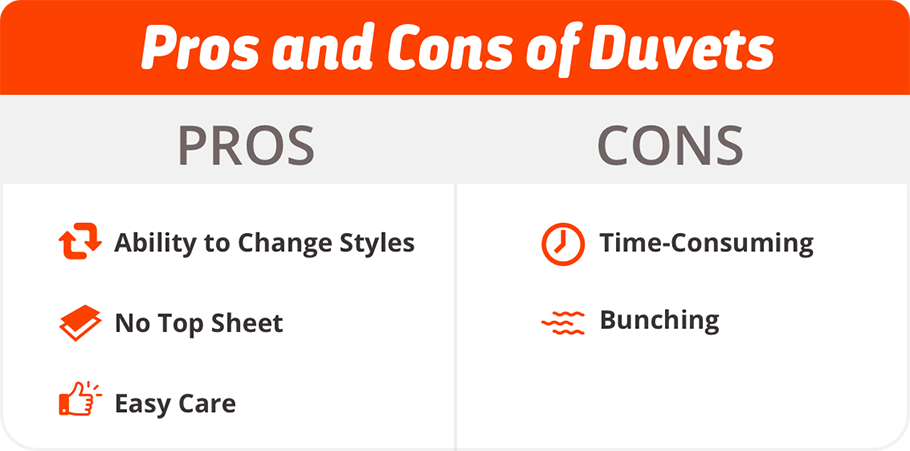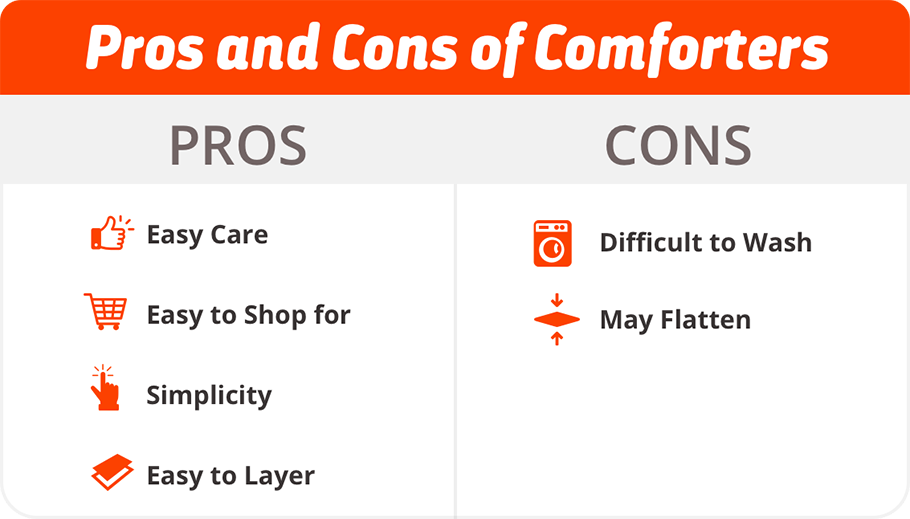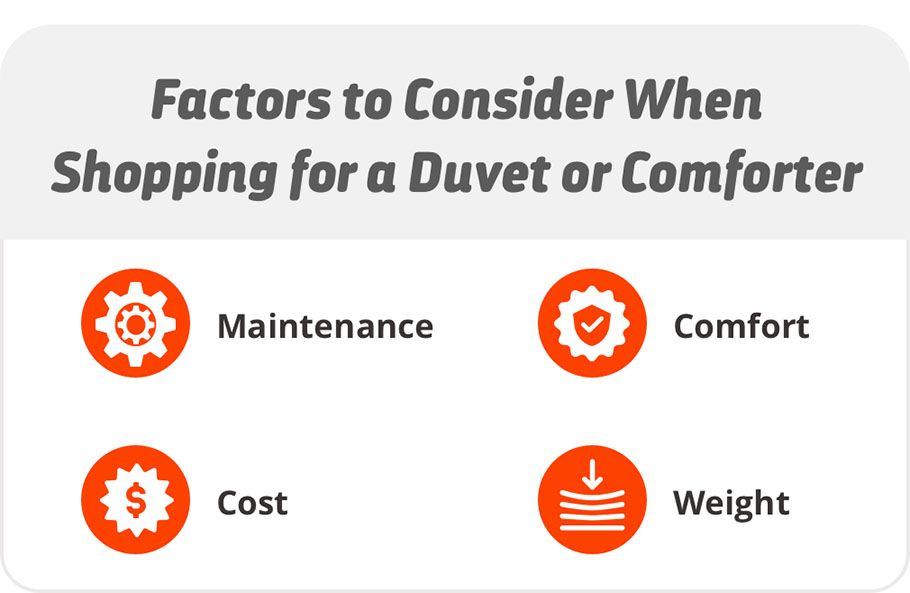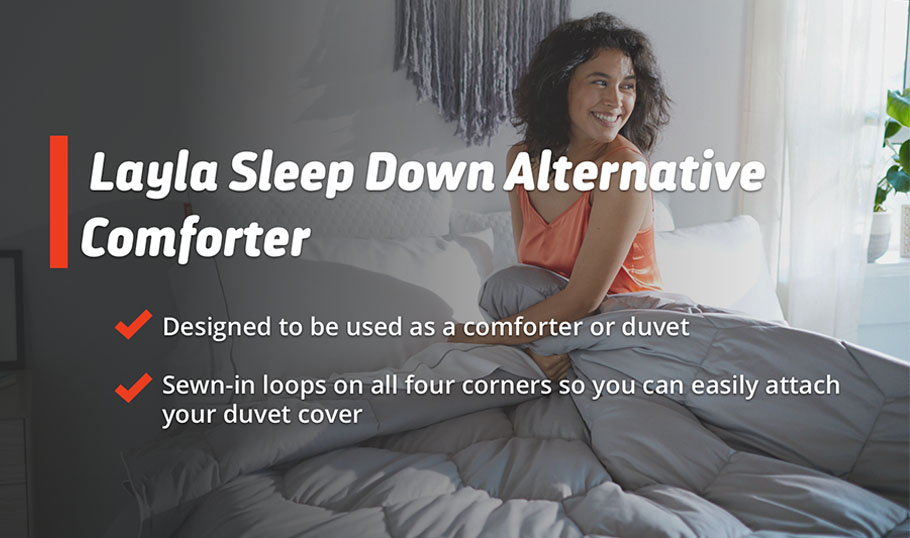Many types of bedding are available to help you get more comfortable, including duvets and comforters. In this article, we’ll highlight what duvets and comforters are so that you can choose the best one for you.
- What Is a Duvet?
- What Is a Comforter?
- What Is the Difference Between a Duvet and a Comforter?
- Pros and Cons of a Duvet
- Pros and Cons of a Comforter
- Should I Choose a Duvet or a Comforter?
- Wrapping Up: Duvet vs. Comforter
What Is a Duvet?
A duvet is a blanket that’s filled with either goose down, down alternative, or other types of natural or synthetic filling. A duvet requires two pieces: the insert and the duvet cover. A duvet can be sewn like a quilt or just around the corners like a bag that’s filled with stuffing. A duvet may also be called a duvet insert as it requires a cover. Duvet inserts are usually white since they won’t be seen as they’ll be inserted into a cover.
What Is a Comforter?
A comforter is similar to a duvet in that it’s a blanket. However, comforters don’t require a cover and come in many different colors. Comforters are filled with natural or synthetic fibers. For example, many people have a down or down alternative comforter. You can easily learn more about what is a down comforter and the difference between down vs. down alternative comforters by reading our comforter buying guide.
Comforters may be sold in bedding sets that contain sheets and pillow shams, but they are also sold separately, so you can mix and match your sheets, comforters, and pillow shams to make decorating your bed easy.
When it comes to quilts vs. comforters, comforters are usually fluffier and warmer. However, comforters can also be ideal for hot sleepers. To learn more, check out the best down comforter for hot sleepers.
What Is the Difference Between a Duvet and a Comforter?
It’s typically a matter of preference when it comes to duvets vs. comforters. Duvets and comforters have similar traits; they’re both the main blanket the people use to keep themselves warm at night. In fact, many people use the two words interchangeably. However, there are noticeable differences between the two.
The more significant difference between duvets and comforters is that duvets require two pieces: the duvet cover and the duvet insert, while comforters are used as-is. As a result, duvets might be best for those who want extra warmth because it’s meant to be used with other sheets and blankets. In fact, duvets perfectly complement weighted blankets for sleep. Comforters can also fit into duvet covers, but make sure to measure your comforter before you purchase a cover.
In the case of a duvet cover vs. a comforter, the difference is that the duvet cover is simply a thin cover for the duvet insert. It’s usually the same thickness as the sheets you put on your bed, but you can find duvet covers of all types.
Pros and Cons of a Duvet
Advantages of Duvets
Ability to Change Styles
Because duvets require a cover, you can have many different styles and colors of covers so that you don’t have to go out and purchase a new blanket to change the look of your bed. Instead, you’ll simply change the duvet insert’s cover.
No Top Sheet
Duvets don’t require a top sheet like a comforter might. Duvet covers are just as soft as top sheets and available in a number of fabrics so that you can find something comfortable no matter your preference. The biggest benefit of not having to use a top sheet is that you won’t have to struggle to make your bed in the morning or wash an extra piece of bedding.
No Top Sheet
Instead of washing your comforter every two weeks, you can choose to simply wash your duvet cover, which takes up less space in your washer and dryer. The size of a duvet cover allows you to wash it with your regular laundry, saving time and electricity.

Cons of Duvets
Time-Consuming
Many people struggle to get their duvet inserted into the duvet cover. While there are tricks that can make it easier, you won’t get an even distribution of the insert if you’re not careful.
Bunching
Duvets move around inside the cover, which means that you might experience bunching that can be irritating or make one area of your body too warm when you sleep with it. Many duvet inserts and covers come with clasps, so you won’t have to worry about your duvet moving around within the insert while you sleep.
Pros and Cons of a Comforter
Advantages of Comforters
Easy Care
While caring for duvets is easy, it’s even easier to wash your comforter because you don’t have to take off a cover. Instead, you can just take your comforter off your bed and throw it in the wash.
Easy to Shop for
Comforters are available in sets with matching sheets and pillow shams so that your bed can match. Comforters are also sold separately so that you can mix and match to style your bed however you want.
Simplicity
Because a comforter is just one piece, you won’t have to worry about anything bunching up or becoming too hot.
Easy to Layer
Many people enjoy sleeping with sheets under their top blanket. If you prefer to layer your bedding, then comforters will be best for you. Comforters can be used with top sheets and other types of blankets.

Cons of Comforters
Difficult to Wash
While caring for your comforter is easy because it only requires you to worry about one piece, washing your comforter may be difficult. Some comforters are too fluffy to fit in the average washing machine or dryers, so you might have to take them to a laundromat or dry cleaner.
Not only that, but comforters are larger than duvets and duvet covers, so they’ll take much longer to wash and dry, and they should be washed alone because they take up most of the space in your machines.
May Flatten
Some comforters may flatten over time because of the filling. However, you can ensure that your comforter doesn’t flatten or get ruined in the wash with proper care.
Should I Choose a Duvet or a Comforter?
Remember, it’s all about comfort. Choosing between a duvet vs. a comforter is a matter of preference. Many people choose duvet covers because they enjoy easily changing colors and styles, while others prefer the ease of a comforter. That being said, there are many things that you should consider before you make your final decision. These include:

Maintenance
As mentioned previously, duvets don’t need to be washed as often as comforters because all you need to do is wash the cover. However, duvet inserts still need to be washed every so often. Some people consider duvets easier to maintain because of the ease of care associated with the duvet cover. However, others prefer comforters because they’re just one piece.
Putting a duvet insert back into a cover can be difficult and time-consuming, so maintenance might actually end up being more trouble than it’s worth for some people. Comforters need to be washed more often than duvets, but they don’t require any additional work on your part.
Comfort
Duvets are usually warmer and fluffier than comforters, but that’s not always the case. Depending on the type of comforter, your comforter might be warmer and fluffier than the average duvet. To determine what’s right for you, consider how warm you get at night. For example, if you prefer to stay cool, consider getting a thinner comforter. If you want to be warm, consider a duvet.
Weight
Comforters are made for comfort and ease of use, while duvets come in weights that signify warmth. However, the weight of the blankets depends on the quality of the filling. For example, comforters filled with down may be heavier than duvets filled with polyester.
Cost
Comforters are often less expensive than duvets, but it all depends on the quality of the item that you purchase. Typically, duvets are made with higher-quality materials, but this isn’t always the case. Before you determine which one is right for you, make sure that you check the price and base your decision on whether or not you’re willing to pay more for higher-quality bedding.
Wrapping Up: Duvet vs. Comforter
Comforters and duvets are comfortable blankets that anyone can use to get a great night’s sleep. Choosing between your two options comes down to your preference, how warm you get a night, and how much maintenance you’re willing to deal with.

If you’re looking for a comfortable blanket that’s easy to care for and can help enhance your sleep, check out the Layla Sleep Down Alternative Comforter. This 100% cotton comforter offers all the same benefits as a down comforter without cruelty. In addition, the machine-washable Layla Comforter can be used with or without a duvet cover and is ideal for sleepers of all types.



